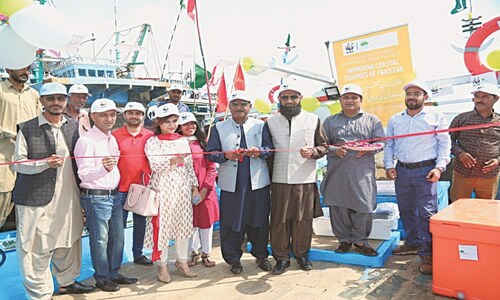Climate change and rising fuel costs are taking a heavy toll on the country’s already vulnerable fishing industry, with fish stocks and seafood exports plunging in recent years.
Muhammad Jawad Akhtar, a former maritime adviser at the Ministry of Planning, Development and Special Initiatives, said that unchecked discharge of industrial and plastic waste and untreated sewage is being compounded by a string of environmental factors such as rising sea levels and temperatures, ocean acidification, coastal erosion, underwater land instability and mud volcanic activity.
“The combined effects of pollution, underwater land instability and climate change in Pakistan, mainly in Karachi, have significantly impacted the country’s fishing sector, altering marine environments, reducing fish populations and damaging infrastructure,” Akhtar told Anadolu.
Industrial and plastic waste pollution is degrading vital marine habitats such as mangroves and coral reefs that are essential for the breeding and sustenance of many fish species, he said.
The resulting habitat loss, changes in fish migration patterns and declining fish stocks are directly affecting local fishermen, forcing them to move toward the coastal waters of Balochistan, he added.
‘Hundreds of boats standing idle’
Local fishing communities are also facing the challenge of rising costs, particularly as fuel prices soar due to the rupee’s depreciation.
Mohammad Iqrar, a fisherman in Karachi, said his monthly operational costs have tripled over the past couple of years — from around Rs600,000 to about Rs1.8 million.
“Hundreds of large boats and fishing trawlers are standing idle at the harbours,” Iqrar, 45, told Anadolu.
Profit margins are much tighter and many fishermen have been forced to cut down operations, he said.
Iqrar added that a glimmer of hope for smaller fishing operations has been the “good rates” being offered by Iranian companies, which has helped them sustain their businesses.
Down by a quarter
Muslim Mohamedi, former president of the Pakistan Fisheries Exporters Association, said overall fish catches could be down by 25 per cent to 30pc this year.
“The seafood industry is facing a jumble of issues, mainly dwindling fish stocks, increasing fuel prices and juvenile fishing that continues to persist despite a government ban,” he told Anadolu.
Climate change and sea pollution are already decreasing fish stocks, while juvenile fishing is further exacerbating the problem, he said.
“Adding to all of this is the rising price of fuel that’s forcing fishermen to reduce their operations. How can the seafood industry flourish in such conditions?” he added.
Akhtar stressed that declining fish stocks and harbour navigation issues have had major economic repercussions for local fishing communities.
He cited the example of Balochistan’s Pasni harbour, which has been closed for more than a decade due to siltation, an outcome of underwater land instability and mud volcanic activity.
The sedimentation and resulting changes in water quality have adversely impacted local fish populations, leading to reduced catches for fishermen in the area, he explained.
He said a comparison of satellite images from 2003 to 2023 revealed a significant development of a sandspit over the past two decades, which altered the hydrodynamic conditions, leading to major changes in the coastline and sand deposition.
Solar solution
Many fishermen in Pasni have fallen into a debt trap, borrowing money to cover the surging costs of fuel, maintenance and other expenses, according to maritime researcher Naufil Shahrukh.
“The pressure of mounting debts and lack of a steady income is leading to severe mental health issues among the community, including depression and hopelessness,” he told Anadolu.
A potential solution to address issues related to climate change and rising fuel costs could be solar-powered fishing boats, he said.
“Solarisation of fishing vessels, fish harbours or fish landing sites and off-grid marine tourism sites for the socioeconomic development of the indigenous fisherfolk … should be an essential part of Pakistan’s fisheries, environmental and energy policies,” said Shahrukh.
Adopting solar technology will reduce fuel and maintenance costs, adding to its environmental benefits, he said, pointing out that similar projects have yielded positive results in India and the Philippines.
“Along with achieving sustainable development goals and promoting the blue economy, it will also help local fishermen get rid of the debt trap,” he said.














































Dear visitor, the comments section is undergoing an overhaul and will return soon.